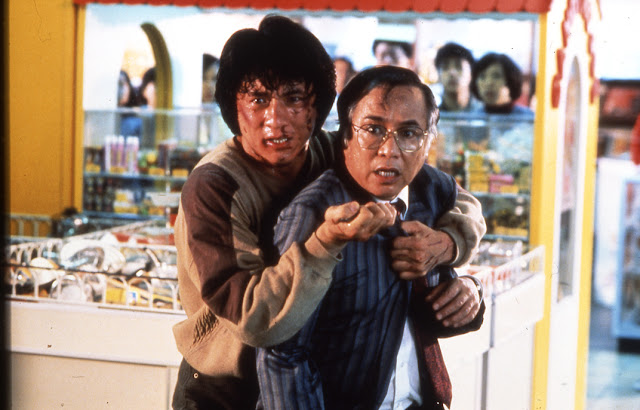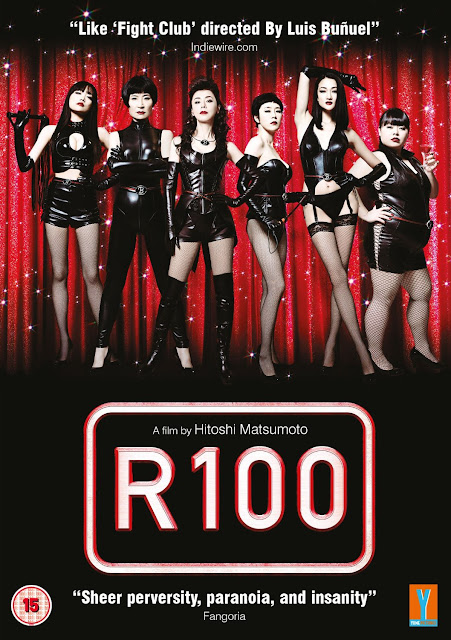It’s easy to forget just how long Jackie Chan has been
making movies. Like many Asian film stars who make their way to Hollywood
careers, Chan already had been a star in his home country for well over a
decade and had thirty odd years of film experience before Western audiences
were exposed to him. He was already in his forties when he started breaking
into the American mainstream, in films like Rumble in the Bronx, Rush Hour and
Shanghai Noon, which are likely where most people first saw him. Long before he
was dazzling American audiences as he flipped around a room, kicked some bad
guys and did something with a chair (there are so many chair scenes in Chan
movies), Chan had already honed and perfected his own style of action movie and
stunts in Hong Kong, in movies like Project A and Police Story.
Made in 1985 and directed by Chan himself, Police Story,
like Project A, is a showcase of everything Chan could do as an actor and
stuntman. Essentially a series of stunts and scenes stringed together with a
crime drama plot, it feels like a culmination of everything Chan wanted to do,
from specific stunts to set pieces. It was successful and popular enough to
spawn its own series of films. The first two were the only ones to be directed
by Chan himself and have largely the same cast, tone and story, so I’ll be
doing them together. They’re both good fun (especially the first one), and
very, very similar to each other. While I do prefer the two Project A movies,
the Police Story series is very likely the more famous and are highly entertaining
in their own right and are probably the more famous and popular of his early
output.
Chan Ka-kui (Jackie Chan) is a hard-working officer in the
Hong Kong police department. After single-handedly apprehending notorious gang
leader Chu Tu during a botched sting operation, Ka-kui is chosen to be a
representative for the police due to his public profile, police skills and
commitment to his job. Not having enough evidence to put Chu Tao away for good,
the police are forced to release him. The Superintendent want Chu Tu’s girlfriend
Salina (Brigitte Lin) to testify in court against him and send Ka-kui to
protect her, much to the annoyance of his girlfriend May (Maggie Cheung). Chu
Tu sends out hitmen to try and kill Salina, putting Ka-kui and May in danger.
Things start out in highly impressive fashion with the entire
opening sequence – a sting operation that goes awry, leading to a gun fight and
a sequence where several cars drive through a shanty town, completely
demolishing it (a sequence so impressive that Michael Bay of all people paid
homage to it in ‘Bad Boys 2’). Shown from several different angles (including
from the stunt cars) it’s the sort of dangerous and realistic stunt that we no
longer get these days, where safe, sterile CGI take the thrill and danger out
of death-defying action. That sequence is instantly followed by another of
Chan’s famed stunts – him hanging on the outside of a speeding bus using an
umbrella as it drives through traffic. It’s good stuff and starts things off
with a bang.
The finale is another highlight, as Chan confronts Chu Tu’s
goons in a shopping mall, demolishing a small portion of it in the process.
Through a series of fistfights and stunts, Chan and various stuntmen smash
through a whole lot of glass panels and displays. It all leads to the film’s
climactic stunt (one of Chan’s more recklessly dangerous ones); Chan slides
several stories down a pole bare-handed, smashing through hundreds of lights.
It’s needlessly dangerous, like most of Chan’s best stunts, but damn if it
isn’t a wonder to witness. Between all that is a surprisingly straight and
serious cop story peppered with comedy. It’s a fun mix, though largely it acts
as an action delivery system.
The film ends with Chan having what can only be described as
a violent emotional breakdown – as Chu Tao is arrested and his lawyer begins to
criticise the police, Chan suddenly snaps and violently beats the crap out of
both, his face contorted in rage as fellow officers attempt to hold him back.
It’s not quite the image or note you’d normally want to end your comedy movie
to end on. Of course it’s immediately followed by the sizzle reel of bloopers
and stunts gone awry that characterise the credits of Chan’s best films, so you
don’t really get to dwell on it too much. Instead you watch in amazement as
Chan and his crew get seriously injured pulling off various stunts.
‘More of the same’ seems to be the operative phrase for the
first sequel, once again directed by Chan. It’s a bit more restrained compared
to the first, particularly with its opening, taking its time before it shows
off any big action sequences, but largely this is as straight a sequel that
could have been done. It has largely the same cast, a very similar feel and
tone. It’s fun as well but there isn’t that much action overall and I’d say that
the first film is more fun and exciting overall.
Chan Ka-Kui (Jackie Chan), following the ending of the last
film (where he seemed to have a violent mental breakdown) has been reinstated
as a police officer, but has been bumped down to traffic patrol as punishment.
Still very unsatisfied with the law and concerned about his relationship with
his girlfriend May (Maggie Cheung), Chan decides to quit the force and go on
holiday with her. But the holiday is over before it even begins: a property
firm is being extorted by a gang of bombers who are threatening to blow up
their various properties if they don’t pay up. The Hong Kong Police convince
Ka-kui to return and help them stop the bombers before anybody else gets hurt. Meanwhile,
Chu Tu, the crime boss from the first film, has been granted compassionate
release from prison due to having a terminal illness – he’s dedicating his
remaining time to ruining Ka-kui’s life.
The few action scenes are good stuff, though very similar to
the first film and spread out a lot more. The film begins with a montage of the
best stunts and moments from the first film (a lot of Chan sequels tend to do
this). Chan fights various goons, in restaurants and playgrounds, giving him
plenty of things to flip over, around and through, and the villainous bombers
are all adept at fighting. The focus on explosions also means a lot more
pyrotechnics. One highlight has Chan, on the top of a speeding bus, duck and
dive over hanging signs before jumping through a glass panel. That’s probably
the highlight of the film. The finale is the only really ‘big’ action scene, a
showdown in a warehouse full of explosives where Chan takes on the gang,
leading to the entire warehouse exploding. It’s all fun stuff, though it’s
fairly similar to the first. If anything the two films feel as though they could
have been shot at the same time, even though there were a few years between
them. I guess Chan’s directing style at the time was very particular.
If there’s an obvious weak point, it’d be the bigger focus
on the Ka-kui/May relationship. For some reason they decided to double down on
that stuff and I can’t say that it works. In the first film, May was an
underwritten character who existed to cause some drama and occasional comedy.
Here the solution to give her a bigger part is to make her suffer more – she’s
constantly being humiliated, attacked or kidnapped by people because of Ka-kui,
be it Chu Tu’s men or the gang of bombers. While Chan’s dealing with both, he’s
also dealing with May wanting to break up with him, with their relationship
scenes treated seriously. The big problem is that Chan and Cheung, while having
comedic chemistry, don’t actually have any romantic chemistry at all (to be
fair it’s arguable as to whether Chan has ever had romantic chemistry with
anybody, but that’s not why you watch his films).
Chan is in fine form both comedic and athletically in both
films, and Officer Ka-kui is pretty much the same role he’d played a few times
before and a few times after. I will say, in these first two films at least,
that Ka-kui is a little more unstable and angry compared to other Chan
characters, like Dragon Ma from Project A. While he goes through similar plot
beats (both ended up going vigilante), Ka-kui gets increasingly frustrated and
furious at both the criminals who openly break the law and at the police
inspectors and officials who don’t support or back-up the police officers. I
guess with Ka-kui Chan tried to show more of a dramatic range than usual, but
it’s a bit odd. The rest of the cast in both films are all game for what are
largely one-note roles, like the stern police Superintendent who has it out for
Ka-kui. In particular, Brigitte Lin and Maggie Cheung have thankless roles, the
former little more than a plot device who needs to be rescued and the latter as
Chan’s long-suffering girlfriend, especially in the sequel. I like Maggie
Cheung, but a lot of her career involved her playing the whiny girlfriend who
complains a lot and gets kidnapped.
These first two Police Story films do have something of a
problem with tone, particularly the first one. They’re all over the place,
switching from light and comedic to dark and serious at the drop of a hat. The
opening of the first film is surprisingly serious, with its realistic gun
violence (well, for a Jackie Chan comedy/action film), heaps of dead/injured
cops, crying children and the focus on a random panicky officer cracking under
pressure during the violence. Not long after that you have scenes of
light-hearted slapstick or juvenile silliness, like a lame elevator fart joke
or a scene where Chan, having stepped in a cowpat, wipes it off his shoe by
imitating Michael Jackson’s dance moves. It’s tonal whiplash, especially since
the underlying plot is pretty much serious business in both despite the comedy.
Speaking of comedy, it’s the usual sort for this era of
Jackie Chan movies. There is a lot of athletic slapstick, some occasionally
juvenile humour and a lot of farcical comedic misunderstandings. It’s mostly
funny stuff, especially if you’re into it, though the darker aspects
occasionally poke through and make it weird. Take the scene where Ka-kui is
left alone to handle all the phones at the station while simultaneously
arranging a date with his girlfriend and trying to eat a bowl of noodles – Chan
juggles four separate phones and conversations, tangling the cables as he
scoots around the office in a roller chair. It’d be light-hearted stuff if it
wasn’t for the fact that two of the calls are for harrowing stuff – one woman
is being beaten by her husband and another wants to report a rape. Not exactly
the sort of subject matter you’d expect for wacky hijinks, but it’s treated as
humour.
If you cut out all the comedic interludes and slapstick, the
base plot of both films is really tried-and-true crime thriller territory.
There are crime lords, corrupt cops, witness protections, wiretapping,
blackmail, extortion, attempted assassinations, being framed for murder,
bombings of public buildings, heroes becoming fugitives and a desperate and
dangerous last-minute dash to get your hands on incriminating evidence/stop the
villains – it’s all stuff that works in a serious dramatic film. Whether it
works in what are essentially action/comedy movies is up to the viewer I guess
(I’d say it mostly works), but it’s hard not to notice how serious the main
plots are and how straight they’re handled.











